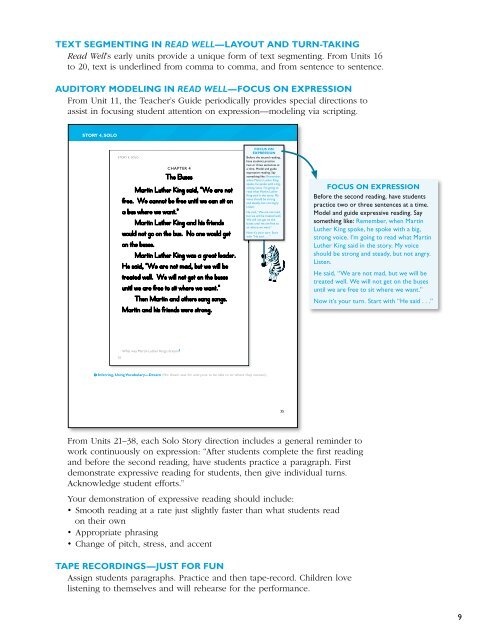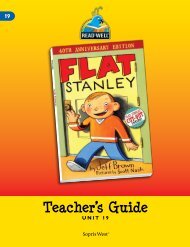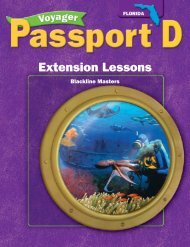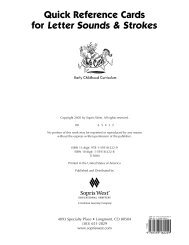<strong>Unit</strong> <strong>27</strong>, Extra Practice 1 Fluency Passage Blackline Master (1 of 1)Reading 1st 2nd 3rd 4th58 © Sopris West Educational Services. All rights reserved.<strong>Unit</strong> <strong>27</strong>, Extra Practice 3 Fluency Passage Blackline Master (1 of 1)ErrorsWords/30 secondswcpmReading 1st 2nd 3rd 4thErrorsWords/30 secondswcpm716243439<strong>Unit</strong> <strong>27</strong>, Extra Practice 2 Fluency Passages Blackline Master (1 of 1)62 © Sopris West Educational Services. All rights reserved.<strong>Unit</strong> <strong>27</strong>, Extra Practice 4 Fluency Passage Blackline Master (1 of 1)Reading 1st 2nd 3rd 4thErrorsWords/30 secondswcpmReading 1st 2nd 3rd 4thErrorsWords/30 secondswcpmFocus on ExpressionPURPOSEThroughout Read Well, instruction includes the three research-basedprocedures for improving expression and fluency: repeated readings,text segmenting, and auditory modeling.ResearchSnapshotREADING WITH EXPRESSIONProsodyThough researchers are unclear of the exactnature of the relationship between comprehensionand expressive reading, researchers know thatthe two are linked. Children who comprehendwell tend to read expressively. Children who readexpressively tend to comprehend well.Tracing what is known about the relationshipbetween expressive reading and comprehension,Downhower (2001) concludes that threeresearch-based procedures—repeated reading,text segmenting, and auditory modeling arerecommended for implementation.REPEATED READINGS in Read Well—SOLO STORIES, HOMEWORK,EXTRA PRACTICEWhen taught with fidelity, Read Well lessons provide children with multipleopportunities for repeated readings. Within the context of Solo Story reading,children read stories twice for accuracy followed by Timed Readings, PartnerReading, and Homework. The Extra Practice lessons from <strong>Unit</strong>s 1 to 23 includetwo additional passages. From <strong>Unit</strong>s 24 to 38, four extra fluency passages areincluded as follows:• Extra Practice 1, Fluency Passage• Extra Practice 2, Fluency PassagesFLUENCY PASSAGEMartin ReadsName______________________________________________When Martin Luther King was little, hewould read and readHe would read to hismother, his sister, and his brother. When hewas a man, he was a minister and a leader.He was a great man.A thematicallyrelated passageof graduallyincreasing lengthacross unitsFLUENCY PASSAGE AFLUENCY PASSAGE BThank You, Martin Luther KingName______________________________________________Martin Luther King was a great man. Hewas a smart man. Thanks to Martin LutherKing, we can all eat and drink where we want.We should remember what Martin LutherKing said. He said great things about us all.He said we should all be treated well.8162661523Two short,thematicallyrelated passagesHave students read the sentences. Time individual studentsfor 30 seconds; mark errors. To determine words correct perminute (wcpm), count words read in 30 seconds, subtracterrors, multiply times two, and record on the chart. If studentcompletes the passage in less than 30 seconds, have him or herreturn to the top and continue reading. (Repeated readings maybe completed with older students, assistants, or parents.)My goal is to read with 0-2 errors. This is what I did:Have students read the sentences on one passage. Timeindividual students for 30 seconds; mark errors. To determinewords correct per minute (wcpm), count words read in 30seconds, subtract errors, multiply times two, and record on thechart. If student completes the passage in less than 30 seconds,have him or her return to the top and continue reading.(Repeated readings may be completed with older students,assistants, or parents.)My goal is to read with 0-2 errors. This is what I did:• Extra Practice 3, Fluency PassageA thematicallyName______________________________________________FLUENCY PASSAGErelated passageMartin Has a DreamMartin Luther King said, "I can see a land 9of graduallywhere all my brothers and sisters will be free. 18One day, things will be better. We will all<strong>27</strong>work together, and this will be a better land. 36 increasing lengthThis is my dream."40across units• Extra Practice 4, Fluency PassageA longer passageName______________________________________________FLUENCY PASSAGEof graduallyMy BrothersMy big brother can run fast. My other8increasing lengthbrother cannot. My big brother will go on the 17swings with me. My other brother will not.25My big brother understands me better than32 across unitsmy other brother. When we were in school,my big brother would look after me. He is astall as my other brother. It is fun beingthe small sister.405059628Have students read the sentences. Time individual studentsfor 30 seconds; mark errors. To determine words correct perminute (wcpm), count words read in 30 seconds, subtracterrors, multiply times two, and record on the chart. If studentcompletes the passage in less than 30 seconds, have him or herreturn to the top and continue reading. (Repeated readings maybe completed with older students, assistants, or parents.)My goal is to read with 0-2 errors. This is what I did:64 © Sopris West Educational Services. All rights reserved.Have students read the sentences. Time individual studentsfor 30 seconds; mark errors. To determine words correct perminute (wcpm), count words read in 30 seconds, subtracterrors, multiply times two, and record on the chart. If studentcompletes the passage in less than 30 seconds, have him or herreturn to the top and continue reading. (Repeated readings maybe completed with older students, assistants, or parents.)My goal is to read with 0-2 errors. This is what I did:66 © Sopris West Educational Services. All rights reserved.
TEXT SEGMENTING In Read Well—LAYOUT AND TURN-TAKINGRead Well’s early units provide a unique form of text segmenting. From <strong>Unit</strong>s 16to 20, text is underlined from comma to comma, and from sentence to sentence.AUDITORY MODELING in Read Well—FOCUS ON EXPRESSIONFrom <strong>Unit</strong> 11, the Teacher’s Guide periodically provides special directions toassist in focusing student attention on expression—modeling via scripting.STORY 4, SOLOSTORY 4, SOLOCHAPTER 4The BusesMartin Luther King said, "We are notfree. We cannot be free until we can sit ona bus where we want."Martin Luther King and his friendswould not go on the bus. No one would geton the buses.Martin Luther King was a great leader.He said, "We are not mad, but we will betreated well. We will not get on the busesuntil we are free to sit where we want."Then Martin and others sang songs.Martin and his friends were strong.FOCUS ONEXPRESSIONBefore the second reading,have students practicetwo or three sentences ata time. Model and guideexpressive reading. Saysomething like: Remember,when Martin Luther Kingspoke, he spoke with a big,strong voice. I’m going toread what Martin LutherKing said in the story. Myvoice should be strongand steady, but not angry.Listen.He said, “We are not mad,but we will be treated well.We will not get on thebuses until we are free tosit where we want.”Now it’s your turn. Startwith “He said . . . ”FOCUS ON EXPRESSIONBefore the second reading, have studentspractice two or three sentences at a time.Model and guide expressive reading. Saysomething like: Remember, when MartinLuther King spoke, he spoke with a big,strong voice. I’m going to read what MartinLuther King said in the story. My voiceshould be strong and steady, but not angry.Listen.He said, “We are not mad, but we will betreated well. We will not get on the busesuntil we are free to sit where we want.”Now it’s your turn. Start with “He said . . .”32What was Martin Luther King's dream? 1 Inferring, Using Vocabulary—Dream (His dream was for everyone to be able to sit where they wanted.)35From <strong>Unit</strong>s 21–38, each Solo Story direction includes a general reminder towork continuously on expression: “After students complete the first readingand before the second reading, have students practice a paragraph. Firstdemonstrate expressive reading for students, then give individual turns.Acknowledge student efforts.”Your demonstration of expressive reading should include:• Smooth reading at a rate just slightly faster than what students readon their own• Appropriate phrasing• Change of pitch, stress, and accentTAPE RECORDINGS—JUST FOR FUNAssign students paragraphs. Practice and then tape-record. Children lovelistening to themselves and will rehearse for the performance.9
- Page 1 and 2: 27Let Freedom RingMartin Luther Kin
- Page 3 and 4: Martin Luther KingTeacher’s Guide
- Page 5 and 6: Ta b l e o f Co n t e n t sHow to T
- Page 7 and 8: IntroductionMartin Luther KingStory
- Page 9 and 10: Phonics (continued)Tricky Words bro
- Page 11 and 12: Day 1• Decoding Practice 1• Sto
- Page 13: Important TipsIn this section, you
- Page 17 and 18: How to Teach the LessonsTeach from
- Page 22 and 23: STORY 1, DUETDUET STORY READING INS
- Page 24 and 25: STORY 1, DUETSTORY 1, DUETNo one re
- Page 26 and 27: SKILL WORK ACTIVITY 1ASOUND PAGEUse
- Page 28 and 29: STORY 2, SOLOSOLO STORY READING INS
- Page 30 and 31: STORY 2, SOLOSTORY 2, SOLOThen Mart
- Page 32 and 33: DECODING PRACTICE 2 SOUND REVIEWUse
- Page 34 and 35: STORY 3, DUETDUET STORY READING INS
- Page 36 and 37: STORY 3, DUETSTORY 3, DUETOne day,
- Page 38 and 39: COMPREHENSION WORK ACTIVITY 3SENTEN
- Page 40 and 41: STORY 4, SOLOSOLO STORY READING INS
- Page 42 and 43: STORY 4, SOLOSTORY 4, SOLO3336
- Page 44 and 45: DECODING PRACTICE 3 SOUND REVIEWIf
- Page 46 and 47: STORY 5, DUETDUET STORY READING INS
- Page 48 and 49: STORY 5, DUETSTORY 5, DUETMartin Lu
- Page 50 and 51: STORY 6, SOLOSOLO STORY READING INS
- Page 52 and 53: STORY 6, SOLOSTORY 6, SOLOHe would
- Page 54 and 55: COMPREHENSION WORK ACTIVITY 6ASTORY
- Page 56 and 57: DECODING PRACTICE 4Note: There are
- Page 58 and 59: End of the UnitIn this section, you
- Page 60 and 61: UNIT 27 ORAL READING FLUENCY ASSESS
- Page 62 and 63: EXTRA PRACTICE 1 SOUNDSHave student
- Page 64 and 65:
Unit 27, Extra Practice 1 Fluency P
- Page 66 and 67:
EXTRA PRACTICE 2 SOUNDS WORD DICTAT
- Page 68 and 69:
Unit 27, Extra Practice 2 Fluency P
- Page 70 and 71:
Unit 27, Extra Practice 3 Fluency P
- Page 72:
Unit 27, Extra Practice 4 Fluency P





